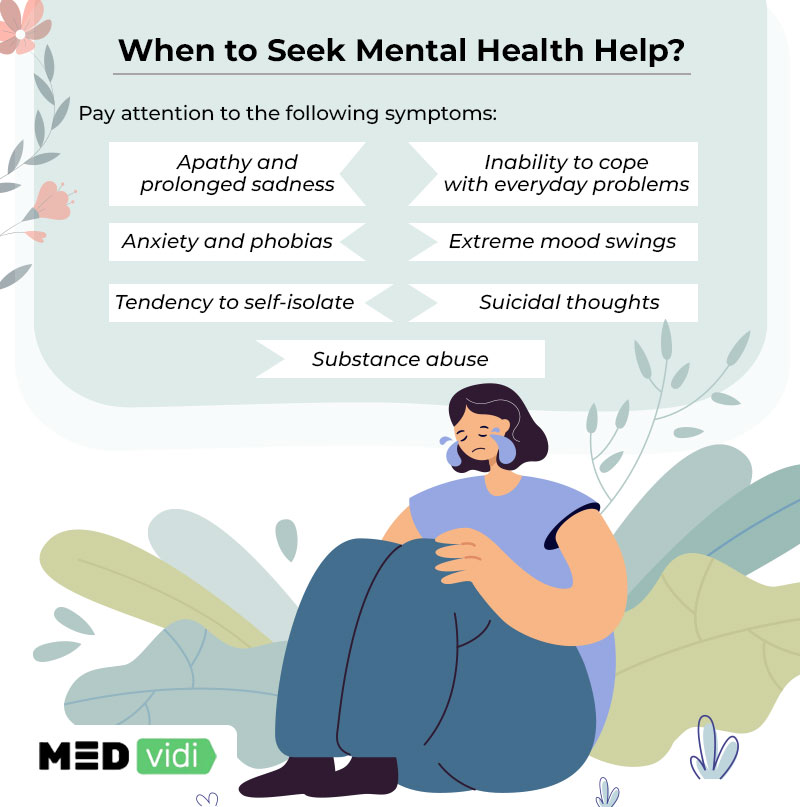The difference between normal mental health and mental health disorders isn’t always straightforward. Some mental conditions have easily observable symptoms, but others may have mild symptoms that are easy to miss or ignore. For example, when does shyness become a social phobia? And when are mood swings a sign of depression?
Here is an overview of how mental health disorders are defined and diagnosed, including guidelines on when and how to seek mental health help for yourself or a loved one.
What is Mental Health?
Mental health refers to the overall wellness of how you think and regulate your feelings, which may also affect how you behave. Mental stability refers to good mental health – the ability to control and regulate your thoughts, feelings, and behaviors according to medical standards, societal expectations, and cultural norms.
According to
Being mentally unstable can affect your ability to function properly in different aspects and settings, including:
- Lower performance at work or school.
- Difficulty maintaining personal or social relationships.
- Having decreased
cognitive skills[2] .
However, there is no uniform standard for stable mental health, especially considering societal expectations and cultural norms. Regardless, seeking mental health support is advisable if you are feeling mentally unstable and wondering how to feel normal again.
How are Mental Health Disorders Diagnosed?
Medical professionals use two guidelines for defining and diagnosing mental health disorders:
- The Diagnostic and Statistical Manual of Mental Disorders (
DSM[3] ) from the American Psychiatric Association (APA). - The International Classification of Diseases (
ICD[4] ) from the World Health Organization (WHO).
Both guidelines explain the signs and symptoms of all known mental disorders. The DSM’s criteria for diagnosing mental health disorders are based on the nature, duration, and impact of the condition’s signs and symptoms. It also describes each disorder’s typical course, risk factors, and common coexisting conditions.
A mental health disorder diagnosis may be based on the following and some other factors:
- A review of your and your family’s medical history of mental health disorders and physical illnesses.
- A review of your and your family’s history of major life events such as abuse, family crises, and trauma.
- A thorough physical exam to rule out physical illnesses that may cause mental disorder symptoms.
- Examining past and current abuse of alcohol and other drugs.
- Checking for recent changes or events in your life that could have impacted your thoughts, feelings, and behaviors.
- Conducting psychological tests on your mental, emotional, and behavioral feedback to analyze your mental health.
- Assessing your mental health concerns and your reasons for seeking help (for example, you may come with questions like “What’s wrong with me mentally”, or “Why do I feel that I need mental help?”).
- Reviewing any past and current thoughts about committing harm against yourself or others.
The diagnostic assessment for some mental disorders also requires insights from people who know you well. For example, your parents or spouse may be required to fill in a questionnaire based on some of the subjects listed above.
A psychologist, psychiatrist, clinical social worker, and other certified medical professionals can make a mental health disorder diagnosis. They may also liaise with your primary care doctor during the diagnostic assessment.
If you’re experiencing suicidal or self-harming thoughts and require immediate assistance, contact a crisis hotline, such as 911, 988 suicide & crisis lifeline (toll-free), or Samaritans (116-123 or via chat).

When to Seek Help From a Healthcare Provider
Each mental condition has its signs and symptoms, and some mental health disorders may not affect people in observable ways. Overall, seeking psychiatric help is advisable if you experience any of the following symptoms usually associated with a mentally unstable person:
- Extreme mood swings.
- Excessive anxiety.
- Substance abuse.
- Disconnection from society and withdrawal from everyday activities.
- Angry, hostile behaviors.
- Apathy and prolonged sadness.
- Making suicidal and violent statements.
- Inability to cope with everyday problems and activities.
- Notable changes in personality.
- Dramatic changes in eating and sleeping patterns.
Unfortunately, many people struggling with mental health disorders ignore their conditions as normal out of fear or shame. Some patients can also stop treatment by thinking, “I am no longer mentally ill.” However, ignoring your condition and avoiding treatment is counterproductive – it is necessary to accept it if you are mentally unwell and start seeking help.
Getting Help
You may find yourself contemplating the following questions if you are mentally not okay:
- Why am I not normal?
- What’s wrong with me?
- Do I have a mental disorder?
- I feel mentally unstable. What should I do?
- Is my mental health at risk?
- Do I have a mental illness?
- Am I mentally ill or just dramatic?
- I am mentally disturbed; where and how can I find help?
- Does everyone have a mental illness?
Seeking help early isessential to treating your condition and enabling you to live mentally healthy. Mental Health America (MHA) recommends taking the following actions to get diagnosed and treated for any underlying mental health disorder:
- Taking validated screening tests to check and monitor your mental health.
- Consulting a therapist.
- Learning about the warning signs and early risk factors of mental health disorders.
- Finding and joining a mental health support group.
- Setting up a Psychiatric Advance Directive.
In Conclusion
Some mental health disorders are easy to miss or ignore. Overall, it is advisable to consult a psychiatrist if you suspect that you or a loved one may be experiencing a mental health disorder. Contact MEDvidi to consult with a mental health expert, get your symptoms examined, and receive a diagnosis and proper treatment.













